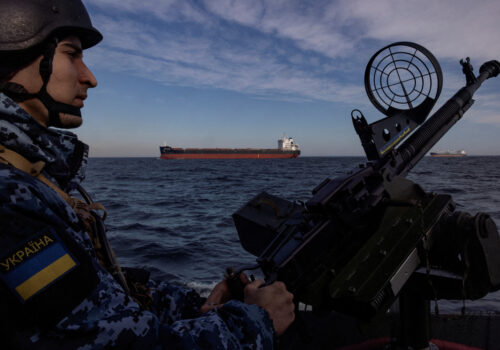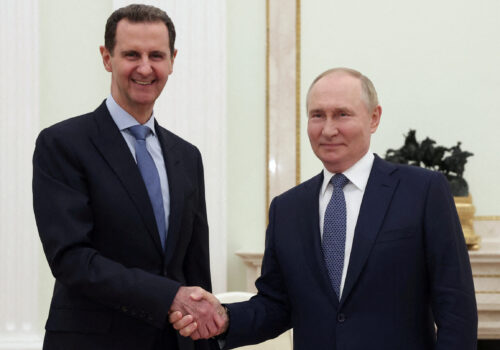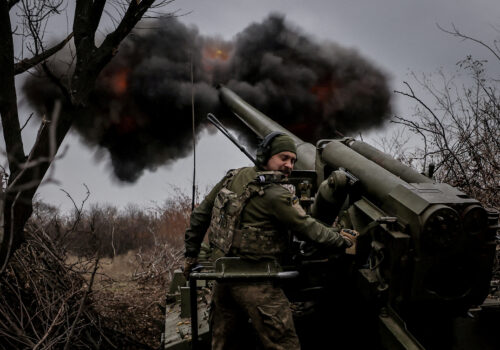World News – 2024 – Video Playlist | Video Playlists | Sites: | newsandtimes.org | links-newsandtimes.com | worldwebtimes.com | southcaucasusnews.com | russianworld.net | jossica.com | octobersurprise2016.org | bklyntimes.com | oceanavenuenews.com | fbireform.com | bloggersunite.net | octobersurprise-2024.org | Trump-News.org | Audio-Posts.com | Bklyn-NY.com | Posts Review – newsandtimes.org
The war unleashed by Russia almost three years ago in Ukraine is rightly recognized as one of the great crimes of the twenty-first century. Understandably, little attention has been paid so far to the impact the conflict is having on Ukraine’s international image. And yet amid the trauma and horror of Russia’s invasion, there are growing signs that the unprecedented media spotlight on Ukraine since 2022 is gradually helping to transform global perceptions of the country. As a result, Ukraine is now finally emerging from a prolonged period of international obscurity that has hindered the country’s progress for centuries.
International ignorance of Ukraine has been a feature since long before the country regained independence in 1991. Following the Soviet collapse, little was done to address this lack of outside awareness or strengthen Ukraine’s national brand in the global arena. This low profile helped set the stage for Russia’s disinformation efforts, with foreign audiences often prepared to believe all manner of outlandish lies about a country that was otherwise unknown to them. Thanks to the recent media focus on Ukraine, Kremlin propagandists are now finding that their distortions are not so readily accepted. This is an ongoing process, but it is already possible to identify a number of important facts about Ukraine that have taken root in the international consciousness since the start of Russia’s full-scale invasion.
1. Ukraine is not Russia
The fact that Ukraine is not Russia may seem insultingly obvious when viewed from a Ukrainian perspective, but in reality this was the fundamental image problem facing the country in 2022. Indeed, it is no coincidence that on the eve of the full-scale invasion, Vladimir Putin published an entire essay denying the legitimacy of a separate Ukrainian state on the grounds that Ukrainians are actually Russians (“one people”).
Putin did not invent this narrative of Ukraine denial himself. His predecessors have been insisting that Ukraine is an inalienable part of Russia since at least the eighteenth century, and have ruthlessly manipulated the historical record to support their arguments. Throughout the Tsarist and Soviet eras, anyone attempting to counter this Great Russian narrative or highlight Ukraine’s long statehood struggle was treated as a dangerous heretic subject to the harshest of punishments.
For generations, Russia was able to impose its imperial propaganda on international audiences, with Ukrainians silenced and Ukraine misleadingly portrayed as an intrinsic part of Russia’s own historical heartlands. It was therefore understandable that when an independent Ukraine appeared on the map in 1991, many had trouble distinguishing it from Russia. This created much confusion and went some way to legitimizing subsequent Russian attempts to reassert its authority over Ukraine.
The full-scale invasion has changed all that. Since February 2022, international perceptions of the relationship between Russia and Ukraine have undergone a radical transformation as global audiences have witnessed the ferocity of the Russian attack and the determination of Ukraine’s national defense. The war unleashed by Vladimir Putin has killed hundreds of thousands and shattered millions of lives; it has also finally buried the Kremlin myth of Russians and Ukrainians as “one people.” As the invasion approaches the three-year mark, it is now safe to say that anyone who continues to insist on the indivisibility of Russia and Ukraine is either acting in bad faith, or is so stunningly ignorant that their opinion can be disregarded.
Stay updated
As the world watches the Russian invasion of Ukraine unfold, UkraineAlert delivers the best Atlantic Council expert insight and analysis on Ukraine twice a week directly to your inbox.
2. Ukraine is huge
Prewar Ukraine’s low international profile encouraged many to imagine the country as an obscure and irrelevant statelet whose fate mattered little to the wider world. Meanwhile, very few people seemed to appreciate that Ukraine was in fact the largest country wholly in Europe. That is no longer the case. Throughout the past three years, the map of Ukraine has featured relentlessly in the international press. Even casual observers have grown familiar with the outline of the country, and cannot have failed to notice how large it looms over its European neighbors.
Media coverage of battlefield developments has also helped to emphasize the sheer size of Ukraine. Despite regular war reports of major offensives and record advances, the overall picture of the front lines has changed little since the first year of the war, underlining the comparative vastness of Ukraine. While Ukraine may still appear small when compared to Russia, it is a huge country by European standards. Growing awareness of this fact is helping to shape perceptions of Ukraine’s geopolitical significance.
3. Ukraine is an agricultural superpower
Prior to 2022, Ukraine was probably best known to many around the world as the site of the Chornobyl disaster. Associations with the world’s worst nuclear accident were particularly unfortunate as Ukraine is anything but a radioactive wasteland. In reality, the country’s real claim to fame is as the breadbasket of Europe. Ukraine’s fabled black soil is among the most fertile land in the entire world, making much of the country a giant garden of agrarian abundance.
Since 2022, Russia’s invasion has helped educate international audiences about Ukraine’s crucial role in global food security. Extensive media coverage of Russia’s Black Sea naval blockade has highlighted the importance of Ukrainian agricultural exports, with disruption caused by Moscow’s interference leading to famine fears in Africa and price hikes on basic foodstuffs throughout the West. Growing awareness of Ukraine’s status as an agricultural superpower has undermined Kremlin efforts to portray the ongoing invasion as a strictly local affair, and has mobilized international opposition to the war.
Eurasia Center events

4. Ukraine is an innovation hub
For decades, international perceptions of Ukraine were plagued by lazy cliches depicting the country as a terminally corrupt backwater on the vodka-soaked fringes of Eastern Europe. These deeply unflattering caricatures of Ukrainian stagnation were always misleading. They are now also hopelessly outdated. Since 2022, Ukraine has demonstrated that it is a sophisticated high tech nation capable of more than holding its own in the most technologically advanced war the world has ever seen. Ukraine’s ability to develop, deploy, and update its own domestically-produced weapons systems on an almost daily basis has done much to debunk the negative stereotypes of old and establish the country’s reputation as a leading innovation hub.
Ukrainian defense tech companies have been responsible for a string of particularly innovative battlefield solutions that have caught the eye of global defense industry giants and helped Ukraine even up the odds against the country’s far larger and wealthier enemy. For example, ground-breaking Ukrainian marine drones have turned the tide in the Battle of the Black Sea and forced Russia’s entire fleet to retreat from Crimea, while Ukrainian long-range drones routinely strike targets deep inside Russia. As a result, “Made in Ukraine” is now recognized as a stamp of quality throughout the international security sector. This image transformation is already attracting international investors and will shape Ukraine’s economic development for decades to come, with the country’s defense industry and broader tech sector set to be in high demand.
5. Ukraine is united
The full-scale invasion has seriously undermined longstanding Russian efforts to portray Ukraine as a country irrevocably split along geographical and ideological lines. The narrative of a divided Ukraine has been a mainstay of Kremlin propaganda since the Soviet era, and has been central to the disinformation that has accompanied the escalating Russian aggression of the past two decades. For many years, this crude oversimplification of Ukraine’s regional complexities proved superficially persuasive among international audiences, but it has been decisively debunked by Ukraine’s united response to Russia’s full-scale invasion.
Ukrainians across the country have overwhelmingly rallied in opposition to the invading Russians, with residents in supposedly “pro-Russian” cities such as Odesa and Kharkiv proving no less determined to defend themselves and their homes. This is not to say that regional diversity is no longer a feature in today’s Ukraine, of course. On the contrary, Ukraine remains just as subject to regional differences as any other large European nation. However, the Russian invasion has shattered the myth of a terminally divided Ukraine and proved beyond any reasonable doubt that the vast majority of Ukrainians bitterly oppose the idea of a Russian reunion.
Peter Dickinson is editor of the Atlantic Council’s UkraineAlert service.
Further reading

UkraineAlert
Nov 18, 2024
Imposing neutrality on Ukraine will not stop Putin or bring peace to Europe
By
Mykola Bielieskov
Imposing neutrality on Ukraine will not bring about a durable peace in Europe. On the contrary, it would leave Ukraine at Putin’s mercy and set the stage for a new Russian invasion, writes Mykola Bielieskov.

UkraineAlert
Dec 17, 2024
Putin’s quiet Syrian surrender reveals the weakness behind his intimidation tactics
By
Peter Dickinson
Vladimir Putin’s inability to save his Syrian ally Bashar Assad is a timely reminder that Russia is far weaker than many appreciate and Western fears of Kremlin escalation are wildly exaggerated, writes Peter Dickinson.

UkraineAlert
Dec 12, 2024
Why Finland thinks Finlandization is a bad idea for Ukraine
By
Minna Ålander
Some believe the Finlandization of Ukraine is the most realistic option to end Russia’s invasion, but any attempt to impose neutrality would leave Ukraine in a precarious position, writes Minna Ålander.
The views expressed in UkraineAlert are solely those of the authors and do not necessarily reflect the views of the Atlantic Council, its staff, or its supporters.

The Eurasia Center’s mission is to enhance transatlantic cooperation in promoting stability, democratic values and prosperity in Eurasia, from Eastern Europe and Turkey in the West to the Caucasus, Russia and Central Asia in the East.
Follow us on social media
and support our work
The post Five things Russia’s invasion has taught the world about Ukraine appeared first on Atlantic Council.
World News – 2024 – Video Playlist | Video Playlists | Sites: | newsandtimes.org | links-newsandtimes.com | worldwebtimes.com | southcaucasusnews.com | russianworld.net | jossica.com | octobersurprise2016.org | bklyntimes.com | oceanavenuenews.com | fbireform.com | bloggersunite.net | octobersurprise-2024.org | Trump-News.org | Audio-Posts.com | Bklyn-NY.com | Posts Review – newsandtimes.org


